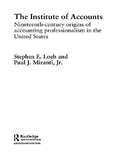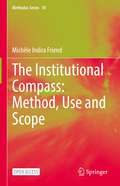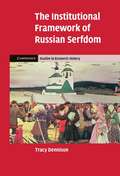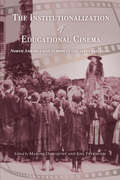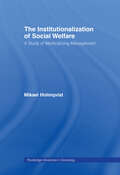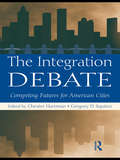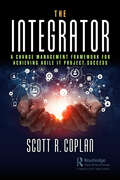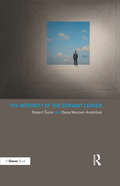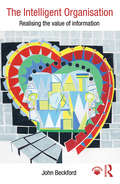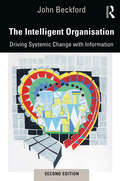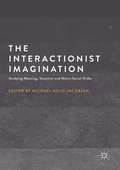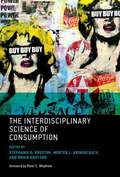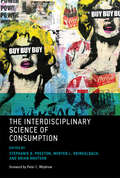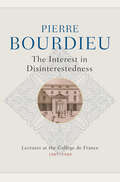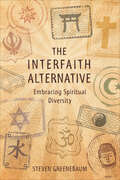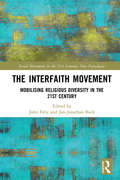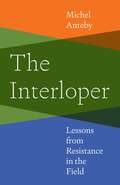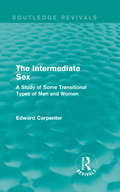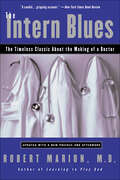- Table View
- List View
The Institute of Accounts (Routledge New Works In Accounting History Ser. #Vol. 1)
by Stephen E. Loeb Paul J. MirantiThis book focuses upon the Institute of Accounts (IA), an organization to which the modern United States accounting profession can trace its roots. The IA was organized in the early 1880s in New York City and, as discussed in this book, attracted a diverse membership that included some of the leading accounting thinkers of the period. The Institute
The Institutional Compass: Method, Use and Scope (Methodos Series #18)
by Michèle Indira FriendThis open access book presents a new generation multi-criteria, multi-stake holder, decision aide, called an "institutional compass". Based on hard data, the compass tells us what quality-direction we are heading in as an institution, region, system or organisation. The quality is not chosen from the usual scalar qualities of: good, neutral and bad. Instead, it is a quality chosen between: harmony, discipline and excitement. None is good in and of itself. We need some of each. The compass marks a new generation in four respects. 1. The representation of the data is intuitive and simple to understand, and therefore can be used to communicate and justify policy decisions. 2. Any data can be included, i.e., none is excluded. This makes the compass tailored to particular situations, voices and contexts. 3. The data includes different time horizons and different types of value: monetary, use, social, sentimental, religious, intrinsic, existential... 4. The process of compass construction can be made inclusive at several junctions. An institutional compass can be extended to evaluate products, add normativity to a systems analysis, reflect world-views such as that of ecological economists or function as an accounting system to manage scarce resources. There are four parts to the book. The first part introduces the general ideas behind the compass. In the second part, the author presents the method for constructing the compass. This includes data collection, data analysis and a mathematical formula to aggregate the data into a single holistic reading. In the third part, the author extends the methodology: to incorporate it into systems science, adding a normative and quality-direction dimension, to use it as a non-linear accounting method and more thoroughly to reflect the philosophy of ecological economists to give a real measure of sustainability. In the fourth part, we see three case studies: one for the World Health Organisation, a second is the use of the compass to label products in a shop and the third is as a regional compass for Hauts-de-France. The book ends with philosophical conclusions. Throughout the book, we see tight arguments, refreshing ideas and a thorough treatment of objectivity in decision making.
The Institutional Framework of Russian Serfdom
by Tracy DennisonRussian rural history has long been based on a 'Peasant Myth', originating with nineteenth-century Romantics and still accepted by many historians today. In this book, Tracy Dennison shows how Russian society looked from below, and finds nothing like the collective, redistributive and market-averse behaviour often attributed to Russian peasants. On the contrary, the Russian rural population was as integrated into regional and even national markets as many of its west European counterparts. Serfdom was a loose garment that enabled different landlords to shape economic institutions, especially property rights, in widely diverse ways. Highly coercive and backward regimes on some landlords' estates existed side-by-side with surprisingly liberal approximations to a rule of law. This book paints a vivid and colourful picture of the everyday reality of rural Russia before the 1861 abolition of serfdom.
The Institutional Theory of the Firm: Embedded Autonomy (Routledge Studies in Management, Organizations and Society)
by Alexander StyhreThe Institutional Theory of the Firm examines recent and previous organization theory literature to advocate what Evans (1995) refers to as the "embedded autonomy" of the firm, as well as its role in being simultaneously anchored in, for example, corporate legislation and regulatory practices on the national, regional (i.e., within the European Union) and transnational levels, while at the same time being granted the right to operate with significant degrees of freedom within this legal-regulatory model. Seen in this view, the embedded autonomy of the corporation represents a theoretical view of the corporation that complements the market-based image of the corporation in economic theory. When advocating the institutional theory model, three forms of embedded autonomy are examined. First, the corporation is enacted as a legal entity sui juris—as a freestanding "legal person" in corporate law and within the regulatory framework that serves to enforce legislation in everyday life settings. Second, the corporation is embedded within what social theorists refer to as moral economies, the norms and values that regulate what are the socially acceptable and legitimate means for conducting business. Third and finally, the corporation is embedded in governance, a relatively complex economic concept that denotes legal and regulatory control on the societal and economic system levels, and on the level of the individual corporation. By combining the three forms of embeddedness, sanctioned by law, norms, and governance, the embedded autonomy of the firm is secured on the basis of a variety of social practices and resources. This book brings together a diverse literature including management studies, economic sociology, legal theory, finance theory, and mainstream economic theory to advance the argument that the corporation is best understood as what is embedded in a social and economic context, yet best serving its defined and stipulated ends by assuming considerable degrees of freedom to operate in isolation from various stakeholders. It will be of relevance for a variety of readers, including graduate students, management scholars, policy-makers, and management consultants interested in organization theory and management studies.
The Institutionalization of Educational Cinema: North America and Europe in the 1910s and 1920s
by Marina Dahlquist and Joel FrykholmEssays by scholars on how film has been used by schools, libraries, governments, and organizations for educational purposes.The potential of films to educate has been crucial for the development of cinema intended to influence culture, and is as important as conceptions of film as a form of art, science, industry, or entertainment. Using the concept of institutionalization as a heuristic for generating new approaches to the history of educational cinema, contributors to this volume study the co-evolving discourses, cultural practices, technical standards, and institutional frameworks that transformed educational cinema from a convincing idea into an enduring genre. The Institutionalization of Educational Cinema examines the methods of production, distribution, and exhibition established for the use of educational films within institutions—such as schools, libraries, and industrial settings—in various national and international contexts and takes a close look at the networks of organizations, individuals, and government agencies that were created as a result of these films’ circulation. Through case studies of educational cinemas in different North American and European countries that explore various modes of institutionalization of educational film, this book highlights the wide range of vested interests that framed the birth of educational and nontheatrical cinema.
The Institutionalization of Educational Cinema: North America and Europe in the 1910s and 1920s
by Marina Dahlquist and Joel FrykholmEssays by scholars on how film has been used by schools, libraries, governments, and organizations for educational purposes.The potential of films to educate has been crucial for the development of cinema intended to influence culture, and is as important as conceptions of film as a form of art, science, industry, or entertainment. Using the concept of institutionalization as a heuristic for generating new approaches to the history of educational cinema, contributors to this volume study the co-evolving discourses, cultural practices, technical standards, and institutional frameworks that transformed educational cinema from a convincing idea into an enduring genre. The Institutionalization of Educational Cinema examines the methods of production, distribution, and exhibition established for the use of educational films within institutions—such as schools, libraries, and industrial settings—in various national and international contexts and takes a close look at the networks of organizations, individuals, and government agencies that were created as a result of these films’ circulation. Through case studies of educational cinemas in different North American and European countries that explore various modes of institutionalization of educational film, this book highlights the wide range of vested interests that framed the birth of educational and nontheatrical cinema.
The Institutionalization of Social Welfare: A Study of Medicalizing Management (Routledge Advances in Sociology #Vol. 30)
by Mikael HolmqvistToday most countries rely on formally organized welfare programs - in some cases to the extent that they are labeled "welfare states". These programs, which have been constructed over the last decades, make up a larger national and international system of good intentions. Overall, it appears inconceivable to imagine "civilized society" without a comprehensive organizational system of social welfare. Social welfare has become a "holy cow" in many societies; an institutionalized aspect of modern life. But how does the institutionalization of social welfare occur through the concrete activities it enacts; and why does the institutionalization of social welfare appear to be so particularly successful in relation to other institutionalizing phenomena? These are central problems for any sociological analysis of contemporary society’s organization and are the main locus of attention of this book. Holmqvist explores how a social welfare organization becomes a self-evident phenomenon by "medicalizing" its environment: a way of "solving" social problems by viewing and treating them as medical problems. This study generates new understandings of how institutionalization of organizations comes about and contributes fresh insight to the area of social welfare policies.
The Institutions of Private Law and Their Social Functions
by Eli GinzbergIn the English-speaking world, Karl Renner is by far the best-known among the Austro-Marxists who were active in the Austrian socialist movement during the first few decades of the twentieth century. Recognition of Renner's scholarship is due largely to the English translations of his works on Marxism, as well as to the secondary writings on his notions of socialist legality and national cultural autonomy.Renner has for over half a century been celebrated for the only book of his that has, to date, been wholly translated into English. It remains the classic socialist attempt to off er a realistic understanding of the role of the legal institution of private property in modern society: The Institutions of Private Law and Their Social Functions. In his introduction to this edition, A. Javier Trevii?1/2o discusses the volume's relevance for today, and briefly describes that aspect of Renner's life that occupied most of this time and energy: his involvement in Austrian social democratic politics.The substance of Renner's exposition remains intact. The text provides one of the best insights into the relationship between capitalism and property's economic functions. It emphasizes how this fundamental institution's application has, since the initial stage of finance capitalism, increased or diminished, been externally transformed, or inherently metamorphosed. In an age of unprecedented global financial crisis, emerging market countries, and increased government regulation, Trevii?1/2o suggests we would do well to heed the book's message. It might help us understand the complex situations we encounter today as we grapple with our hybrid identities as salaried workers and economic investors.
The Integral Nature of Things: Critical Reflections on the Present
by Lata ManiThe world is an interdependent whole of which everything is an integral, complexly related, part. Yet current ways of thinking, and being, persistently separate social phenomena and the individual self from the multiple dimensions with which they are interconnected. The Integral Nature of Things examines this revealing paradox and its consequences in a variety of sites: everyday language, labour, advertising, technology, post-structuralist theory, political rhetoric, urban planning, sex, neoliberal globalisation. Mani demonstrates how even though the interrelations between things are obscured by the ruling paradigm, the facts of relationality and indivisibility continually assert themselves. The book interweaves prose with poetry and sociocultural analysis with observational accounts to offer an alternative framework for addressing aspects of the cognitive, cultural, political, and ethical crisis we face today.
The Integration Debate: Competing Futures For American Cities
by Chester Hartman Gregory D. SquiresRacial integration, and policies intended to achieve greater integration, continue to generate controversy in the United States, with some of the most heated debates taking place among long-standing advocates of racial equality. Today, many nonwhites express what has been referred to as "integration exhaustion" as they question the value of integration in today’s world. And many whites exhibit what has been labeled "race fatigue," arguing that we have done enough to reconcile the races. Many policies have been implemented in efforts to open up traditionally restricted neighborhoods, while others have been designed to diversify traditionally poor, often nonwhite, neighborhoods. Still, racial segregation persists, along with the many social costs of such patterns of uneven development. This book explores both long-standing and emerging controversies over the nation’s ongoing struggles with discrimination and segregation. More urgently, it offers guidance on how these barriers can be overcome to achieve truly balanced and integrated living patterns.
The Integrator: A Change Management Framework for Achieving Agile IT Project Success
by Scott R. CoplanWhen a $145 million IT project failure pushes Los Angeles to the edge of financial meltdown, the County CEO asks Max McLellan, a harried IT project manager, aka The Integrator, for help. The County Board gives Max 30 days to identify the problem and find a solution. At first Max finds the usual missteps, but something bigger and darker beckons, an explosive source of project failure. He must do something different, rattling ghosts of previous County IT failures, uncloaking crookedness, and exposing truths that shatter careers. With some people rooting for his failure, Max battles to fit all the pieces together with the County team, applying his proven framework to define the problem, plan a solution and execute it successfully. It’s common knowledge that barely 50% of IT projects succeed, per a 2017 Project Management Institute report. Equally well-known, approximately 70% of large-scale change management initiatives fail according to a 2017 McKinsey & Co. report. Given the challenge to overcome these low success rates, The Integrator offers a proven narrative on the organizational change framework for achieving Agile IT project management success based on the author’s 45+ year client experiences and published research. The Integrator defines change management as the single overarching methodology integrating Agile IT and project management. It does this because all projects are about change – significant organizational and personal change. The people involved – their participation in and understanding and support of these changes – ultimately determine IT projects success or failure. In fact, while all IT projects are about change, successful projects change human behavior. The methodologies included in the framework, described in The Integrator, include: • Change management as defined by AIM (Accelerating Implementation Methodology). • Project management as defined by the Project Management Institute (PMI) Guide to the Project Management Body of Knowledge (PMBOK Guide) standard. • IT management as derived from the Institute of Electrical Engineers (IEEE) Guide to the Software Engineering Body of Knowledge (SWEBOK) standard. • Agile as defined by the Agile Alliance’s Agile Manifesto. Written by a certified Project Management Professional and accredited change management practitioner, The Integrator chronicles the challenges involved in applying this framework in a real-world setting to achieve successful project implementation.
The Integrity of the Servant Leader
by Robert Sumi Dana Mesner-AndolšekThe impact of the global financial crisis is still being felt today and the deeply unethical behaviour of the top level leaders at those economic and financial organizations, that were at the heart of the crisis, has served to highlight the importance of integrity, and in particular the need for servant leadership, if we are to avoid another major catastrophe in the management of both commercial and non-profit organizations. Servant leadership has many features in common with transformational leadership but is primarily focused on caring about employees and their personal development. Ethical behaviour is one of the most important components of successful leadership yet this remains insufficiently investigated, especially from an interdisciplinary perspective. With the help of theory, empirical analysis and the relevant methodological apparatus, the authors fill the gap in the analysis of integrity and its impact on leadership and locate the significant factors which affect integrity in general. They develop and assess the forces that impact Servant Leadership style, as well as the ability to engender trust. As a starting point they make two assumptions: An important element in leading is the ethical dimension of leadership; The ratio of factors that affect leading and the servant leadership style is complex, but the integrity of leaders is the most important among them. The authors examine four integrated scientific areas: ethics and business ethics, human resource management and psychology and focus on the analysis of the process of leadership and the factors within that process of leading that influence its success and its ethical dimension.
The Intellectual Foundations of Chinese Modernity
by Edmund S. FungIn the early twentieth century, China was on the brink of change. Different ideologies - those of radicalism, conservatism, liberalism, and social democracy - were much debated in political and intellectual circles. Whereas previous works have analyzed these trends in isolation, Edmund S. K. Fung shows how they related to one another and how intellectuals in China engaged according to their cultural and political persuasions. The author argues that it is this interrelatedness and interplay between different schools of thought that are central to the understanding of Chinese modernity, for many of the debates that began in the Republican era still resonate in China today. The book charts the development of these ideologies and explores the work and influence of the intellectuals who were associated with them. In its challenge to previous scholarship and the breadth of its approach, the book makes a major contribution to the study of Chinese political philosophy and intellectual history.
The Intellectual Lives of Children
by Susan EngelA look inside the minds of young children shows how we can better nurture their abilities to think and grow.Adults easily recognize children’s imagination at work as they play. Yet most of us know little about what really goes on inside their heads as they encounter the problems and complexities of the world around them. In The Intellectual Lives of Children, Susan Engel brings together an extraordinary body of research to explain how toddlers, preschoolers, and elementary-aged children think. By understanding the science behind how children observe their world, explain new phenomena, and solve problems, parents and teachers will be better equipped to guide the next generation to become perceptive and insightful thinkers.The activities that engross kids can seem frivolous, but they can teach us a great deal about cognitive development. A young girl’s bug collection reveals important lessons about how children ask questions and organize information. Watching a young boy scoop mud can illuminate the process of invention. When a child ponders the mystery of death, we witness how children build ideas. But adults shouldn’t just stand around watching. When parents are creative, it can rub off on their children. Engel shows how parents and teachers can stimulate children’s curiosity by presenting them with mysteries to solve.Unfortunately, in our homes and schools, we too often train children to behave rather than nurture their rich and active minds. This focus is misguided, since it is with their first inquiries and inventions—and the adult world’s response to them—that children lay the foundation for a lifetime of learning and good thinking. Engel offers readers a scientifically based approach that will encourage children’s intellectual growth and set them on the path of inquiry, invention, and ideas.
The Intelligent Organisation: Realising the value of information
by John BeckfordThe Intelligent Organisation offers a radical model of organisation based on the integration of structure, individuals and information. In this game-changing book, leading consultant John Beckford proposes a different way of designing organisations in order to transform their performance and capitalise on the potential offered by contemporary information capability. This book demonstrates how an organisation designed backwards from its customers provides optimised autonomy for individuals and integrated, coherent information. Drawing on ideas from management science, business information management, organisation theory and extensive professional practice, Beckford argues that organisations have not evolved to process and derive meaning from exponentially increasing availability of data, and that the use of data for optimum performance requires fundamental organisational changes, not incremental improvement. Beckford demonstrates how to effect these changes in real practice and the positive results these changes can yield, as well as the challenges in implementation and how to work around them.Beckford’s style is lively and direct, but his arguments are academically rigorous, striking a persuasive balance between accessibility and authority. The text is supported by case studies throughout and a dedicated website, www.intelligentorganisation.com, with support materials for lecturers. The Intelligent Organisation will be of significance to Masters and Undergraduate students reading Business Studies, Information Systems, Business Information Systems, Computer Science, Business Management and Management Science.
The Intelligent Organisation: Realising the value of information
by John BeckfordThe Intelligent Organisation proposes a radically different way of designing organisations to capitalise on the potential offered by contemporary information capability. Intelligent Organisations, designed backwards from their customers, recognise information as their key source of competitive advantage. An Intelligent Organisation uses information to drive learning and adaptation at the level of individuals, tasks, processes and the whole organisation, to deliver transformational changes in business performance. This fully updated 2nd edition explores how to enable this change through systemic reinvention. Drawing on proven organisational applications exploiting data, information and management science, and grounded in tested theory, this book is not about incremental improvement, but about fundamentally rethinking the whole. Building on the first edition, two chapters have been added to apply the ideas of the Intelligent Organisation to the individual as well as to the nation. Further discussion on the current issues around technology and ethics have been incorporated, as well as review questions and improved pedagogy. The text contains updated case studies throughout, and is accompanied by a dedicated website, www.intelligentorganisation.com, with support materials for lecturers. Uniquely bridging the gap between information systems and organisational behaviour, The Intelligent Organisation will be of particular significance to Masters and Undergraduate students of Information Systems, Knowledge Management and Organisational Theory.
The Interactionist Imagination
by Michael Hviid JacobsenThis book outlines the history and developments of interactionist social thought through a consideration of its key figures. Arranged chronologically, each chapter illustrates the impact that individual sociologists working within an interactionism framework have had on interactionism as perspective and on the discipline of sociology as such. It presents analyses of interactionist theorists from Georg Simmel through to Herbert Bulmer and Erving Goffman and onto the more recent contributions of Arlie R. Hochschild and Gary Alan Fine. Through an engagement with the latest scholarship this work shows that in a discipline often focused on macrosocial developments and large-scale structures, the interactionist perspective which privileges the study of human interaction has continued relevance. The broad scope of this book will make it an invaluable resource for scholars and students of sociology, social theory, cultural studies, media studies, social psychology, criminology and anthropology.
The Interdisciplinary Science of Consumption
by Peter C. Whybrow Stephanie D. Preston Morten L. Kringelbach Brian KnutsonOur drive to consume -- our desire for food, clothing, smart phones, and megahomes -- evolved from our ancestors' drive to survive. But the psychological and neural processes that originally evolved to guide mammals toward resources that are necessary but scarce may mislead us in modern conditions of material abundance. Such phenomena as obesity, financial bubbles, hoarding, and shopping sprees suggest a mismatch between our instinct to consume and our current environment. This volume brings together research from psychology, neuroscience, economics, marketing, animal behavior, and evolution to explore the causes and consequences of consumption. Contributors consider such topics as how animal food-storing informs human consumption; the downside of evolved "fast and frugal" rules for eating; how future discounting and the draw toward immediate rewards influence food consumption, addiction, and our ability to save; overconsumption as social display; and the policy implications of consumption science.Taken together, the chapters make the case for an emerging interdisciplinary science of consumption that reflects commonalities across species, domains, and fields of inquiry. By carefully comparing mechanisms that underlie seemingly disparate outcomes, we can achieve a unified understanding of consumption that could benefit both science and society.
The Interdisciplinary Science of Consumption (The\mit Press Ser.)
by Stephanie D. Preston Morten L. Kringelbach Brian KnutsonScholars from psychology, neuroscience, economics, animal behavior, and evolution describe the latest research on the causes and consequences of overconsumption.Our drive to consume—our desire for food, clothing, smart phones, and megahomes—evolved from our ancestors' drive to survive. But the psychological and neural processes that originally evolved to guide mammals toward resources that are necessary but scarce may mislead us in modern conditions of material abundance. Such phenomena as obesity, financial bubbles, hoarding, and shopping sprees suggest a mismatch between our instinct to consume and our current environment. This volume brings together research from psychology, neuroscience, economics, marketing, animal behavior, and evolution to explore the causes and consequences of consumption. Contributors consider such topics as how animal food-storing informs human consumption; the downside of evolved “fast and frugal” rules for eating; how future discounting and the draw toward immediate rewards influence food consumption, addiction, and our ability to save; overconsumption as social display; and the policy implications of consumption science.Taken together, the chapters make the case for an emerging interdisciplinary science of consumption that reflects commonalities across species, domains, and fields of inquiry. By carefully comparing mechanisms that underlie seemingly disparate outcomes, we can achieve a unified understanding of consumption that could benefit both science and society.
The Interest in Disinterestedness: Lectures at the College de France 1987-1989
by Pierre BourdieuA key feature of those who work for the state, in the legal system and in public services is that they claim to be putting their own personal interests aside and working in a disinterested fashion, for the public good. But is disinterested behaviour possible? Can law be treated as a set of universal rules that are independent of particular interests, or is this mere ideology? Is the state bureaucracy a universal class, as Hegel thought, or a structure that serves the interests of the dominant class, as Marx claimed?In his lecture courses at the Collège de France in 1987–88 and 1988–89, Pierre Bourdieu addressed these questions by examining the formation of the legal and bureaucratic fields characteristic of the modern state, uncovering the historical and social conditions that enable a social group to form and find its own interests in the very fact of serving interests that go beyond it. For a disinterested universe to emerge, it needs both the invention of a public service, or a spirit of service to the public cause, and the creation of a social universe in which individuals can pursue a career devoted to public service and be rewarded for it. In other words, it requires a process of specialization whereby autonomous, specific fields become established in the social cosmos within which a special kind of game that follows the rules of disinterest can be played out.By reconstructing the conditions under which an interest in disinterestedness emerged, Bourdieu sheds new light on the formation of the modern state and legal system and provides a fresh perspective on the many professions in modern societies that are oriented towards the service of the common good.
The Interfaith Alternative: Embracing Spiritual Diversity
by Steven GreenebaumThere is no them — there is only us, celebrating our common humanityWhatever your spiritual path, chances are that the primary tenets of your faith include universal love, acceptance, and compassion. Yet three thousand years after Moses, twenty-five hundred years after the Buddha, two thousand years after Jesus, and fifteen hundred years after Muhammad, we are still divided by our differences. Religious intolerance, discrimination, even persecution and violence make up the not-so-golden rule.The Interfaith Alternative shows us how we can celebrate each other without fear of losing our own identity. It illuminates the path to creating a nurturing spiritual community that honors and includes all religious languages—an alternative to Jews worshiping only with Jews, Christians with Christians, and Muslims with Muslims. In doing so, it demonstrates that through coming together in a mutually supportive environment we can concentrate on our shared desire to remake the world into a compassionate, loving place.At its core, Interfaith is about community and justice. Once we truly embrace diversity, we embrace our common humanity. A powerful antidote to the current climate of fear and mistrust, The Interfaith Alternative argues that it is not how we encounter the sacred, but what we do about it that counts—there are positive alternatives to religious lines in the sand.Steven Greenebaum is an Interfaith minister whose experiences directing choirs of different faiths and denominations have helped him to understand the profound wisdom of many spiritual traditions. Steven has dedicated his life to working for social and environmental justice. He is the founder of the Living Interfaith Church in Lynnwood, Washington.
The Interfaith Movement: Mobilising Religious Diversity in the 21st Century (Social Movements in the 21st Century: New Paradigms)
by John Fahy Jan-Jonathan BockAlthough its beginnings can be traced back to the late 19th century, the interfaith movement has only recently begun to attract mainstream attention, with governments, religious leaders and grassroots activists around the world increasingly turning to interfaith dialogue and collective action to address the challenges posed and explore the opportunities presented by religious diversity in a globalising world. This volume explores the history and development of the interfaith movement by engaging with new theoretical perspectives and a diverse range of case studies from around the world. The first book to bring together experts in the fields of religion, politics and social movement theory to offer an in-depth social analysis of the interfaith movement, it not only sheds new light on the movement itself, but challenges the longstanding academic division of labour that confines ‘religious’ and ‘social’ movements to separate spheres of inquiry.
The Interloper: Lessons from Resistance in the Field
by Michel AntebyA practical and theoretical guide for field researchers struggling with accessResistance is the bane of all field researchers, who are often viewed as interlopers when they enter a community and start asking questions. People obstruct investigations and hide evidence. They shelve complaints, silence dissent, and even forget their own past and deny having done so. How can we learn about a community when its members resist so strongly? The answer is that the resistance itself is sometimes the key.Michel Anteby explains how community members often disclose more than intended when they close ranks and create obstacles. He draws insights from diverse stories of resistance by uncooperative participants—from Nazi rocket scientists and Harvard professors to Disney union busters and people who secure cadavers for medical school dissection—to reveal how field resistance manifests itself and how researchers can learn from it. He argues that many forms of resistance are retrospectively telling, and that these forms are the routine products, not by-products, of the field. That means that resistance mechanisms are not only indicative of something else happening; instead, they often are the very data points that can shed light on how participants make sense of their worlds.An essential guide for ethnographers, sociologists, and all field researchers seeking access, The Interloper shares practical and theoretical insights into the value of having the door slammed in your face.
The Intermediate Sex: A Study of Some Transitional Types of Men and Women (Routledge Revivals: The Collected Works of Edward Carpenter)
by Edward CarpenterThe Intermediate sex collates papers from Edward Carpenter on his ideas about intermediate types. Carpenter claims that there are those in societies who hold an intermediate position between the two sexes and may have an inner sex in their mind that is different from their biological sex. Originally published in 1908, this version in1941, these papers present early observations about gender fluidity in both men and women, studying certain ‘types’ of intermediate people that he claimed were begin to emerge more obviously at the time of writing. This title will be of interest to students of gender studies.
The Intern Blues: The Timeless Classic About the Making of a Doctor
by Robert MarionThe classic “gripping account” of three young doctors in training at a New York City hospital, updated with a new preface and afterword (The New York Times Book Review).While supervising a small group of interns at a major New York medical center, Dr. Robert Marion asked three of them to keep a careful diary over the course of a year. Andy, Mark, and Amy vividly describe their real-life lessons in treating very sick children; confronting child abuse and the awful human impact of the AIDS epidemic; skirting the indifference of the hospital bureaucracy; and overcoming their own fears, insecurities, and constant fatigue. Their stories are harrowing and often funny; their personal triumph is unforgettable.This updated edition of The Intern Blues includes a new preface from the author discussing the status of medical training in America today and a new afterword updating the reader on the lives of the three young interns who first shared their stories with readers more than a decade ago.“Thought-provoking, informative.” —Publishers Weekly‘The diary format effectively dramatizes the often-agonizing decisions and compromises that are made in the face of sleepless nights and inexperience . . . an important book for anyone contemplating the long, arduous task of becoming a doctor.” —Library Journal
